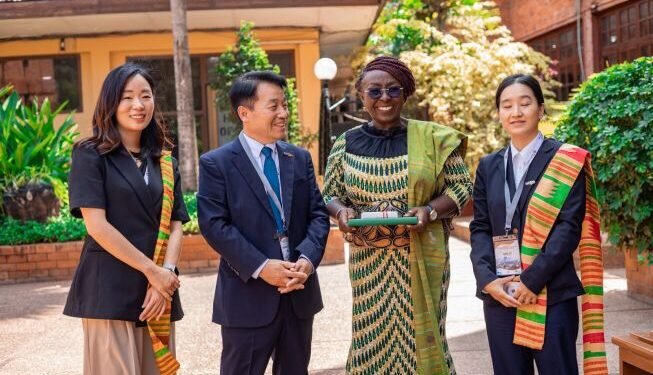Five years after the African Continental Free Trade Area (AfCFTA) came into force, West Africa’s vision of a seamless and integrated regional market remains under threat.
While the region, including Ghana, has strategic potential to become a logistics and manufacturing hub, entrenched inefficiencies, corruption, and poor border management continue to stall trade. Experts warn that unless urgent reforms are implemented, the $50 billion annual trade potential of AfCFTA may remain out of reach.
Muda Yusuf, Chief Executive Officer of the Centre for the Promotion of Private Enterprise (CPPE), highlighted the severe impact of corruption and extortion on West African trade at a recent sub-regional seminar of the Union of African Shippers’ Council. He described the Abidjan–Lagos corridor—stretching through Côte d’Ivoire, Ghana, Togo, Benin, and Nigeria—as “a case study in dysfunction.”
Ghana, as a major transit point along this corridor, experiences the ripple effects of these inefficiencies. Over 80 checkpoints, many of them unofficial, line the corridor, forcing truck drivers and traders to pay informal fees just to move goods.
“The cost of moving goods across the region has reached unsustainable levels,” Yusuf said. “This threatens both government revenues and private sector viability across West Africa, [including Ghana].”
Inefficient Logistics Systems Inflate Costs
High transport costs have made exports from West Africa, including Ghana, less competitive within the sub-region. Manufacturers, especially those in fast-moving consumer goods, face losses from delayed or damaged shipments. Logistics companies, forced to factor extortion premiums into freight pricing, raise costs for consumers and fuel inflation in imported inputs.
Yusuf explained that poor coordination among customs, port, and border agencies worsens the problem. Manual documentation and lack of harmonized digital platforms mean exporters often spend days repeating clearance procedures at each border post.
“The ECOWAS Trade Liberalisation Scheme (ETLS) was designed to reduce duplication, but in practice, very few customs officers recognize the ETLS certificate,” he said. “Rules exist on paper but are meaningless in the field.”
Ghana as a Regional Model
Despite regional challenges, Ghana has shown that reform is possible. Tema port has become a regional benchmark for efficiency, demonstrating how digitization and automation can streamline trade. Ghana is generating real-time trade data and improving revenue collection, offering a model for neighboring countries.
Dabney Shall-Holma, Chairperson of the Sealink Implementation Committee, emphasized the importance of regional maritime connectivity. “We are not even trading efficiently among ourselves. Ghana has shown that political will and coordination can improve trade outcomes,” she said.
While Ghana makes progress, inefficiencies in neighboring Nigeria continue to slow trade across West Africa. Nigeria accounts for nearly half of West Africa’s GDP and serves as a major gateway for landlocked countries. Delays along the Lagos–Seme axis and the Apapa logistics corridor create bottlenecks that affect Ghanaian traders and others in the region.
“Ghana and Senegal have demonstrated that automation of port tariffs and trade documentation is possible. They are already generating real-time trade data and expanding revenue collection. What remains is political will and coordination.”
Dabney Shall-Holma
Ghana’s experience shows that digital customs systems, automated port operations, and electronic cargo tracking can reduce delays, lower costs, and improve predictability for traders.
Shall-Holma stressed that Ghana’s leadership in trade facilitation must be paired with regional coordination. “If other countries along the corridor adopt similar systems, West Africa can unlock the full $50 billion AfCFTA potential,” she said.
Yusuf also highlighted the need for accountability mechanisms to curb extortion by security agencies, ensuring that reforms are effective.
Experts agree that the main challenge is governance failure, not lack of policy ideas. Checkpoints removed by official order often reappear, and bureaucratic loopholes inflate trade costs.
“The corridor problem is about governance failure,” Yusuf said. “Until there are real consequences for officials who sabotage integration, West Africa’s AfCFTA trade ambitions—including Ghana’s role in the corridor—will remain a dream.”
West Africa’s $50 billion AfCFTA trade potential, shared by countries including Ghana, can still become a reality—but only with urgent reforms. Reducing corruption, harmonizing customs procedures, deploying digital platforms, and investing in regional logistics are essential.
Manufacturers, traders, and logistics firms across West Africa, including Ghana, stand to gain billions in trade value if non-tariff barriers are reduced and cross-border processes streamlined. “Investors will naturally choose locations with fewer barriers. West Africa’s AfCFTA vision depends on action, not promises,” Yusuf warned.
READ ALSO:2026 Budget Faces Harsh Reality Check as IMF Reveals Ghana’s Massive Tax Gap























